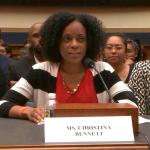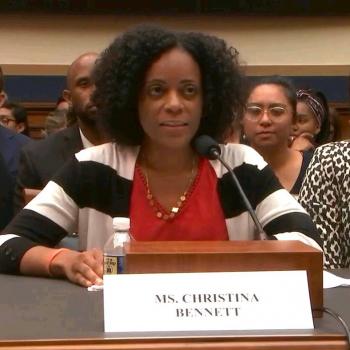
From observation to leadership.
Several 2020 Democratic presidential hopefuls are including slavery reparations bills such as H.R. 40 as a key focus of their platforms. A respected global news agency recently contacted me with an invitation to share my thoughts about it. My initial response was “thank you but no thanks”. It isn’t because I don’t feel that the conversation is important. It is however, because I don’t feel that my thoughts have had enough time to mature. There are too many controversial issues and numerous outlets for the average person to platform their opinions in this era. As a result, my greatest desire is to either speak with great clarity or not to speak at all. The ancient King Solomon astutely observed that “even the fool is thought wise until he opens his mouth.”
There are certain moments when the doors of history swing open or swing shut upon the “yes” of the readied heart. God looks most especially upon those who are somewhat painfully aware of their own insufficiency. Upon contacting me again, I reluctantly agreed the interview. Internally, I also agreed to the task of inviting the Church to discuss and potentially lead this discourse. The national conversations surrounding race relations and justice issues throughout our history have never been comfortable. They have never been easy to navigate or simple to understand. Most of the issues are incredibly complex containing layers of historical, sociological, political, and spiritual dimension. Consequently, it takes supernatural measures of intellect, poise, humility, nuance, mercy, and self-control to engage in a God- honoring way. How then are we supposed to lead?
Where is the God of Elijah?
For at least two thirds of my life, I’ve cared deeply about racial issues and carried a divine burden. I wrote my first paper on the subject for a 6th grade history class. For the past five years, i’ve traveled the country preaching and teaching on related subjects from a biblical worldview perspective. In every era, the atmospheric conditions of the cultural climate tend to dictate what is emphasized about Jesus. Today, i’m discovering attributes of His character that I believe are critical to the times in which we live. The polarizing climate of this country is exacerbated by identity politics, renewed ethnocentrism, and heightened racial sensitivities within public discourse. Perhaps like never before, the Church must gain understanding of Jesus as the bringer of Justice.
But, many millennials are questioning whether the Gospel is relevant to the racial discussion at all. Consequently, they are rejecting the notion that Christian faith is sufficient to bring resolve to the inequities of our day. The cultural groaning that we are witnessing has given birth to multiple protest movements within the past few years. The goals, objectives, methods, and agendas of these secular movements could collectively be summarized in one spiritual question.“Where is the God of Elijah?”
Answering that question requires willingness to journey with others through times of earnest exploration, intense challenge, encouragement, and practical empowerment. The foundation of God’s throne is justice and righteousness. Jesus is the proprietor of the blueprints of societal transformation that this generation seeks. When we come into a higher revelation of the way Jesus accomplishes justice, everything changes. We can then function as ambassadors of that Kingdom in which all things have been reconciled through Christ. From that posture, we become architects, builders, repairers of the breach, and restorers of the streets.
Those from among you Shall build the old waste places;
You shall raise up the foundations of many generations;
And you shall be called the Repairer of the Breach,
The Restorer of Streets to Dwell In.
—Isaiah 58:12
From Wounding to Healing

Chattel slavery is at the very root of the discussions and issues that we have faced. Generally, this is difficult to recognize or fully comprehend for those in majority culture. Perhaps this is due to America’s strong national cultural value for forward progress. As opposed to many other countries around the world with thousands of years of history and cultural conflict; the United States experiment has existed for less than 250 years. As a result, we’ve yet to gain a mature corporate understanding of how intensely our yesterdays are impacting us today. Perhaps this is also due to the frequency of the weekly news cycles and our accessibility to information. In the information age, something that happened just a few months ago can seem like ancient history by tomorrow.
Thankfully, God works outside of the constraints of our western sensibilities to accomplish His good pleasure in and through us. Because of drastic changes in various areas of society since the end of the Civil Rights Movement, many have assumed that everything is generally fine. Yet for countless decades, we’ve languished under the weight of generational transgressions; set in motion by our foremothers and forefathers. As a result, we’ve been grieving. Although this is our present state, we can be encouraged by the promise of comfort.
“Blessed are those who mourn, for they shall be comforted” (Matthew 5:4)
Since the August 2014 death of Michael Brown in Ferguson, Missouri; I believe that we’ve been witnessing and experiencing the outworking of God’s sovereign hand. He still disciplines nations, using the least severe means to accomplish the most possible good. Consequently, I believe He is bringing exposure and foundational correction to the Church and Civil government in America. The depth and intensity of our exposure is revealing the presence of deep trauma within the psyches of all Americans. As chaos reveals unhealed wounding in the souls of every people, God is disciplining the Church. This discipline is producing a lament or a mourning that positions us for an unprecedented outpouring of divine healing. However, this healing that can be received only if we respond rightly.
Throughout the New Testament we see themes and promises of impending blessing for those who are in mourning. In the Church, wounding from our not-so-distant past has affected our mental, emotional, and social well being. We’re crippled in our capacity to see, hear, love, and walk together in the way that Christ requires. This prevents our ability to display His beauty within society. However, God is actively preparing a mature and spotless Bride for His Son. Nothing brings refinement and cleansing like the purifying fire that comes through divine terror. Beyond the pain, we can find comfort and hope in the redemptive goodness of God. When Ephraim saw his sickness and Judah saw their wound, the prophet Hosea said:
Come, let us return to the Lord; for he has torn us, that he may heal us
he has struck us down, and he will bind us up.
After two days he will revive us; on the third day he will raise us up,
that we may live before him. (Hosea 6:1-2)
From Reparations to Reconciliation
The fundamental purpose for redressing atrocities, then, is to accentuate a common humanity between perpetrator and victims. Properly understood, a reparation is the revelation and realization of this common humanity. Properly understood, a reparation is the revelation and realization of this common humanity.—Roy L. Brooks (Los Angeles Times)
Only the Gospel of Jesus Christ can bring the revelation of our common humanity. The theological vanguard of the historic African-American civil rights movement was the fact that we are all bearers of the image of God. Furthermore, Jesus commissioned the ministry of reconciliation to His Church. This means that no other institution on Earth has been given primary authority to bring about real conciliation. The church must be the mouthpiece of God and the instrument of heaven to bring resolutions and answers to the existential questions from history that no one else can address. We recognize the destruction that our sin nature can bring as sons of Adam. Daily we experience the redemption, mercy, and grace of being transformed through Jesus, the second Adam.
Therefore our message is simple: Be reconciled to God. This ministry of reconciliation is not simply the reparation of the breach between God and humanity in terms of salvation. It is the reconciliation of all the matters of life and godliness pertaining to mankind and God. It reconciles the pain of our shared past to the perplexity of our present and the promise of our shared future.
History is alive among us
We are scarcely 155 years removed from the Emancipation Proclamation. Consequently, there are elderly African Americans (millions) living today who possess childhood memories of relationships with individuals born on operating slave plantations. They experienced and navigated the Jim Crow era America. Scores of these senior citizens have experienced tremendous victories and crushing defeats. They carry testimonies of healing and overcoming, but also of great pain. There are countless others who have never experienced transformation or resolution from the past, both black and white. We’re inheriting their trauma. Therefore in my view, the very emergence of a serious national conversation about reparations for slavery is a prophetic signpost to the church. It’s an indicator of the great need for a “repair” that has yet to occur in our history. Beyond that, could it be a supernatural invitation from God?
Resist the cultural temptation
The temptation for all believers is to reduce the reparations discussion to the language that the politicians most exclusively speak: “policy”. For more progressive leaning believers, it will be to question and demonize those who don’t support reparations . For more conservative leaning believers, it will be the temptation to delegitimize the whole discussion and demonize the motives of those who advocate for reparations. I am not naive to the motive concerns behind a given candidate or party’s advocacy on this or any given issue. However, the presence of impure motives has never negated the purity of heaven’s intent or hindered the timing of heaven’s agenda. Indeed, God assures us that rocks will cry out if we don’t. He uses whomever He chooses to accomplish His will, regardless of earthly affiliations.
The challenge for every christian regardless of political leanings is to seek an eternal perspective regarding the times in which we live. The way we respond to or engage with the racial discussion is an opportunity to grow in Christ-like character. We must guard our hearts and minds approaching this with humility, curiosity, and openness as to how we may provide input that might facilitate Godly resolutions.
We must gain understanding of the times like the Biblical sons of Issachar. Could the reparations discussion ultimately be a new entry point for the Church to regain her voice in the cultural conversation? Do we possess the spiritual maturity to resist the temptation of immediately picking sides? Can we reject invitations to the carnal debates that the political tribes will wage? Will we play a key role in formulating a holistic plan that could facilitate an unprecedented healing renewal in the land?












